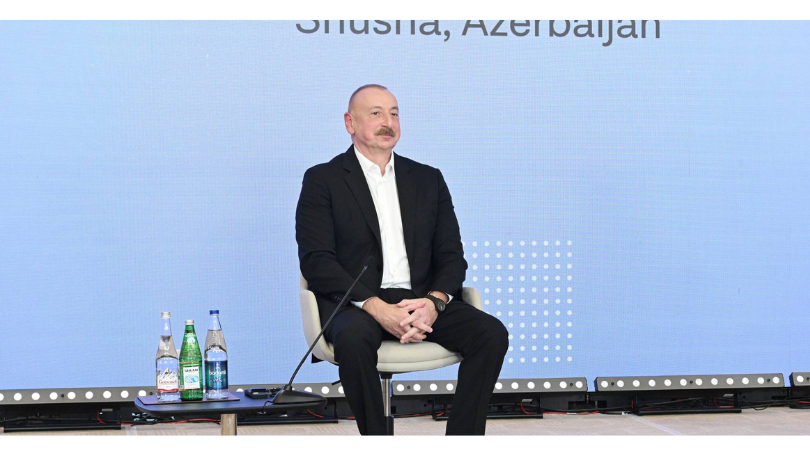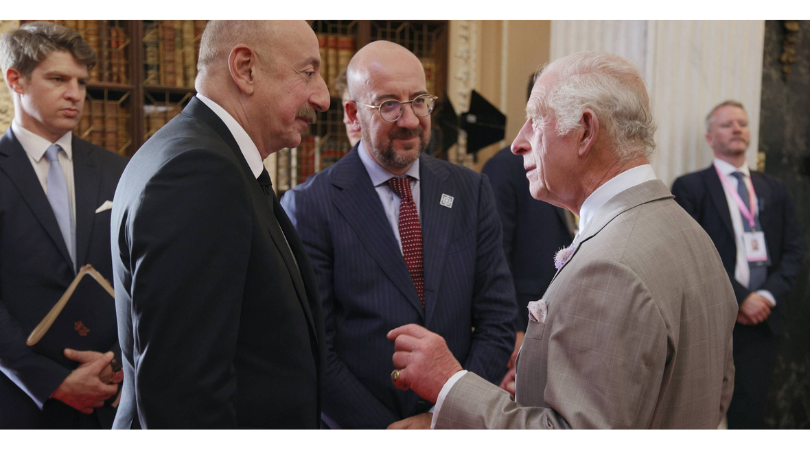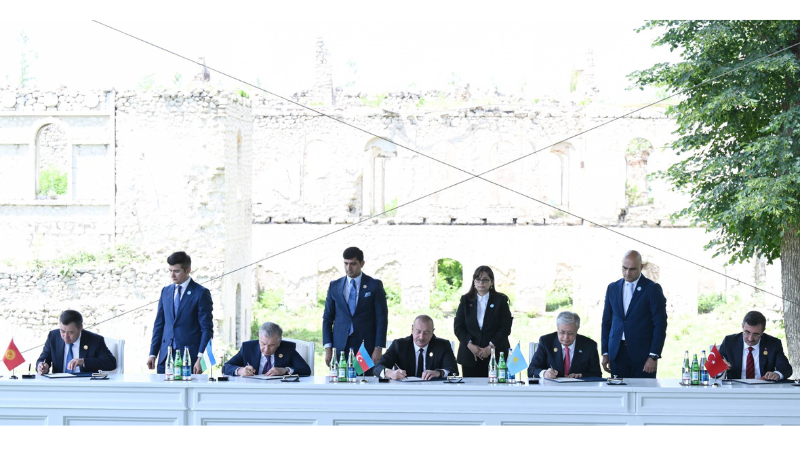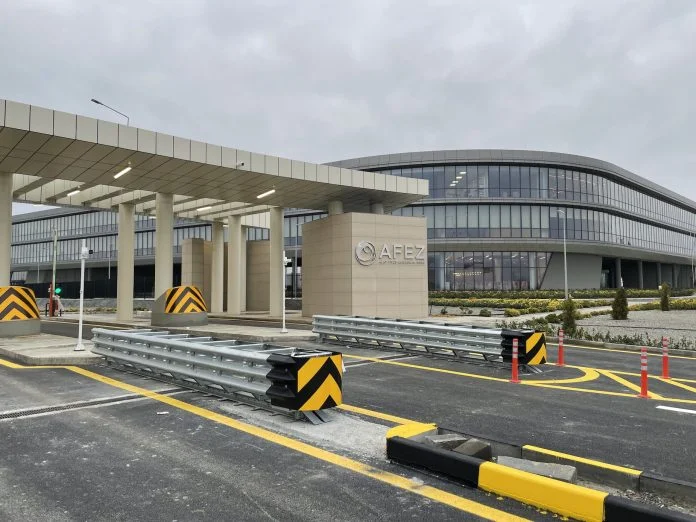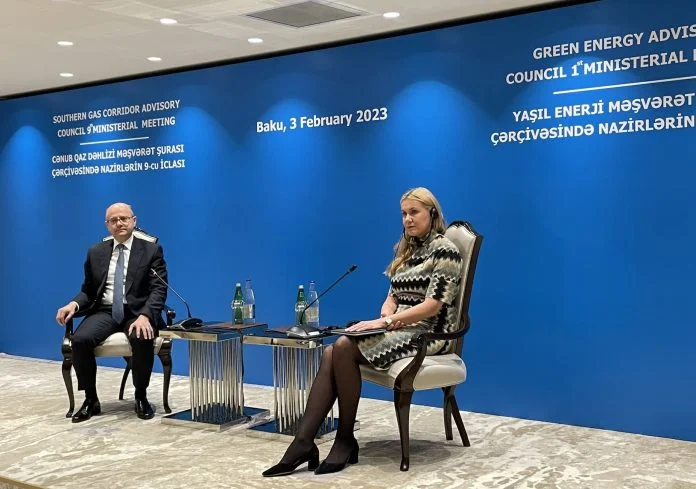Azerbaijan planning to launch green energy exports to Europe
Azerbaijan, which is already a main exporter of oil and gas, plans to develop its renewable energy potential, especially offshore wind in the Caspian Sea around the Absheron Peninsula, and export cheap electricity to Europe.
“I’m glad that we started with oil, we went to natural gas, which is the cleanest form of fossil fuels, and now the circle is complete with green energy and we’re doing all this with our European partners,” Azerbaijan’s deputy Energy Minister Elnur Soltanov told NE Global on the sidelines of the 9th Ministerial Meeting of the Southern Gas Corridor Advisory Council and the 1st Ministerial Meeting of the Green Energy Advisory Council on February 3 at the Gulustan Palace in Baku.
At the same venue, WindEurope CEO Gilles Dickson highlighted that this was the first time the energy ministers from the Southern Gas Corridor countries held a parallel meeting on green energy. “The EU and Azerbaijan and other countries have been collaborating for many years on the Southern Gas Corridor and now today they have started collaborating on green energy, specifically renewables and how Azerbaijan can not only export gas to Europe but how it can export renewable energy to Europe as well,” Dickson told NE Global in Baku on February 3.
Black Sea submarine power cable to connect Azerbaijan, Georgia to EU
Dickson reminded that Azerbaijan has agreed already with Georgia, Romania, and Hungary to build a new power cable across the Caucasus and under the Black Sea that can help bring renewable electricity to Europe. “This is really encouraging and it’s great that the ministers that normally come together just to talk about the Southern Gas Corridor have today for the first time also had a serious discussion about renewable energy and how Azerbaijan with this huge potential for onshore and offshore wind can help provide yet more renewable energy to Europe. So, this is positive. This is win-win and Europe with its very strong wind energy industry can make this happen in this country,” the WindEurope CEO quipped.
157 GW offshore wind capacity in the Caspian Sea
At the Ministry of Foreign Affairs in Baku, Economic Cooperation Department head Orkhan Zeynalov told NE Global on February 2 that Azerbaijan has set the main target to increase the share of the installed capacity of renewable energy from 17 percent to 30 percent in the country’s overall energy balance by 2030. “But that goal also can be enhanced during the period because we are getting the new generation capacity installed, new volumes are coming,” Zeynalov said. “In 2021, we adopted two revolutionary laws on renewable energy and energy efficiency and those laws will allow us to engage more with foreign investors willing to engage in the solar, wind power industry. We have enormous potential in the offshore wind energy in the Caspian Sea – 157 GW, world class resources, very close to the production areas,” he said.
Soltanov reminded that natural gas and oil are exhaustible. “By moving to renewable energy, we’re placing our partnership with European countries on a horizon that will last forever so to me symbolically that is very important,” he said. “The reason we’re talking about adding green energy in our energy mix regarding our cooperation with European countries is that in the same Caspian Sea we discovered a huge source of offshore wind. We’re talking about 157 GW. This is really 20 times more than what Azerbaijan needs,” he added.
The Deputy Energy Minister said the same way the massive Shah Deniz gas field laid the foundation of Azerbaijan’s natural gas relationship with Europe, the potential for 157 GW of offshore wind is a firm basis on which Baku can build a relationship with European countries.
The Alat Free Economic Zone (AFEZ) Authority’s Chairman of the Board Valeh Alasgarov echoed Soltanov’s assessment of Azerbaijan’s wind energy capacity in the surrounding areas of the Absheron Peninsula. “It’s comparable capacity of wind energy in North Sea,” he told NE Global at the AFEZ headquarters in Baku earlier that day on February 3.
The AFEZ Authority Chairman noted that while the oil and natural gas sector is key for Azerbaijan, the country also wants to harness opportunities in other sectors through innovative private sector initiatives, including wind and solar industries.
AFEZ Authority woos European renewables industry
Alasgarov proposed establishing at a first stage assembling of renewable energy equipment in the Alat Free Economic Zone, which would reduce the price of electricity production. “At the next stage if you organize production of all equipment here price will drop much more and because of low price of equipment, low price of construction, low cost of operation, cost of energy produced and exported to Europe will be cheaper,” he said.
Alasgarov said that a few days earlier he travelled to Disselhoff, Dortmund and Gladbach in Germany where he discussed renewable energy with state officials. He noted that the only way to accelerate the process of electricity production in Azerbaijan and surrounding countries is by establishing the manufacture of solar panels and power stations in the Alat Free Economic Zone.
He argued that the same successful principles of extraterritoriality and the independence of the regulatory body established for oil and gas projects could be established for green energy production and export. “Without the establishment of such regime for gas projects, the price of gas would have been much higher and much more unpredictable for investors. Predictability is very important for any investor,” Alasgarov said. “In addition to Baku-Tbilisi-Ceyhan pipeline, in addition to South Gas Corridor pipeline, it’s a new pipeline for green energy,” he opined.
Soltanov also stressed that local content is going to be important because renewable energy technologies are very expensive. “We have ships and certain infrastructure and experience in terms of oil and gas platforms. This experience now could be used, at least some of that, in building offshore wind platforms. There are very interesting synergies. It will be very easy for us to move to offshore green energy being an oil and gas country,” he argued.
He acknowledged the big distance between Azerbaijan and Europe. “This basically means increased cost. But the scale of the offshore wind is so huge that we believe there is something that could become the basis of our energy cooperation with Europe,” the deputy Energy Minister said, adding that Azerbaijan’s plans are in line with Europe’s decarbonization and green energy transition goals.
Like the AFEZ Authority Chairman, Soltanov noted that Azerbaijan gained a lot of experience and mutual trust in terms of its oil and gas relationship with Europe and now the same experience can be taken and applied to the field of green energy. “It’s the same political framework, it’s the same financial institutions that are going to be acting here as well. So, all that experience is very handy as we move from natural gas to green energy. So, we are not inventing something new, we’re going down the same parallel path,” Soltanov said. “There’re very interesting synergies to be seen and benefited from. For instance, one interesting thing is, in Azerbaijan most of the electricity is natural gas based. As we produce more and more green energy this means we can be saving more and more gas which could be exported again to our partners,” Soltavov said, adding that planned energy efficiency measures would free additional gas for export.
At a press conference of Azerbaijan’s Energy Minister Parviz Shahbazov and EU Energy Commissioner Kadri Simson at Gulustan Palace after the SGC Council, the Commissioner said if domestic electricity production is replaced by renewables, that would allow Azerbaijan to free up some of the gas needed in international markets after Russia cut supplies.
Soltanov reminded that Azerbaijan’s President Ilham Aliyev in his speech on February 3 said there are very interesting synergies between natural gas and green energy. “I believe they are going to help each other and one of those options is that the existing gas infrastructure could be used to now ship green gases like hydrogen,” Soltanov told NE Global, adding, “The feasibility studies are done, the jury is out, we need to look at those kinds of calculations very, very carefully. But again, the infrastructure base, the diplomatic experience, the political experience, the mutual trust that we have, we believe combined with the sizeable resources that we have, and programs in the European Union and Azerbaijan combined will give us very fertile ground to move forward and close this circle that started with oil, continues with natural gas with this endless green energy”.

